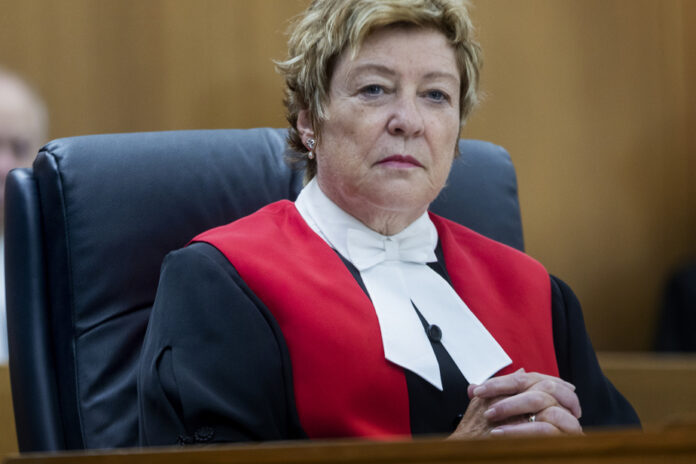Quebec Minister of Justice Simon Jolin-Barrette and Chief Justice of the Court of Quebec Lucie Rondeau bury the hatchet over the reform of the judges’ schedule. Quebec creates 14 new judicial positions, while the Court of Quebec undertakes to sit more and meet certain targets.
A compromise “. This word comes up four times in the first paragraph of the agreement made public Friday afternoon. This agreement, in effect until December 2025, is the result of four months of negotiations led by former judge Jacques Chamberland, appointed facilitator by the parties last January. Essentially, both sides cut the pear in half to break the deadlock.
It must be said that for months, the positions of the Legault government and the Court of Quebec were poles apart in this heated and very public conflict between the Minister of Justice and Chief Justice Lucie Rondeau. Minister Jolin-Barrette even fought before the Court of Appeal to overturn the decision of the Chief Justice.
The minister feared that the Rondeau reform would lead to an “avalanche” of thousands of judicial process halts due to unreasonable delays. Many players in the judicial system had also sounded the alarm in recent months. Even the Director of Criminal and Penal Prosecutions (DPCP) was preparing to prioritize certain files to the detriment of others.
“We have a shared responsibility to provide citizens with accessible, timely and humane justice services. We also thank Mr. Chamberland for his work on the file,” added the Minister.
At the heart of the conflict: the “reorganization” of the work schedule of judges introduced by the Court of Quebec, without consulting the government. Concretely, since September 2022, the judges of the criminal and penal division hear fewer cases in the courtroom to have more time to deliberate. The judges sit every other day (ratio 1/1), whereas they previously sat for two days and deliberated on the third day (ratio 2/1).
To compensate for the loss of thousands of hearing days per year, Chief Justice Lucie Rondeau demanded the addition of 41 judges, which Quebec firmly refused. But as part of this “compromise”, Quebec throws ballast and undertakes to appoint this year 14 new judges to the criminal and penal division.
In return, the judges of the criminal and penal chamber will have to sit 17 days more per judicial year. Magistrates have been sitting for 104 days since September 2022, whereas they were previously on the bench for 139 days a year. From now on, they will sit 121 days a year. The new ratio of sitting days is therefore between 1/1 and 2/1.
To end the conflict, the Court of Quebec made other concessions. In fact, the judiciary undertakes to achieve three new targets at the end of the agreement, including that of significantly reducing the median time for closing cases. Currently, a criminal case stretches for about 300 days, which is 50% more than in 2018-2019. Under the agreement, this period is to be increased to 212 days.
The judiciary and the Ministry of Justice also want to increase the “closure rate” of files from 0.91 to 1.10. In practice, this means that at the end of the agreement, there will have to be more criminal files that will end than files that will be opened.
Final target: 87.7% of criminal cases must ultimately be completed within the ceilings of 18 or 30 months established by the Supreme Court in the Jordan judgment on reasonable delays. The ratio is currently stagnating at 79.4%, which suggests many stays of proceedings. That said, a criminal case can exceed the prescribed time limit without falling through.
A quarterly follow-up will be carried out by Québec and the Court of Québec to assess the impact of the measures and the progress of the targets. In the meantime, Quebec intends to ensure that reliable statistics are available on many key indicators. Thus, any “significant” deviation from the objectives will be highlighted.
The Barreau du Québec is “pleased” with the conclusion of this agreement. “We welcome the commitment of the parties to greater efficiency of justice. More specifically, the adoption of concrete and measurable performance indicators concerning judicial delays represents a historic measure, which will certainly benefit all Quebec citizens,” said the president of Quebec, Me Catherine Claveau, in an email to The Press.
The same goes for the Director of Criminal and Penal Prosecutions, for whom the agreement “will promote compliance with the legal deadlines prescribed by the Supreme Court in the Jordan judgment, which is likely to reassure victims who hope for a resolution on their record.” “The DPCP ensures its collaboration in the implementation of lasting solutions to the problem of judicial delays for the benefit of victims, defendants and society as a whole,” spokesperson Audrey Roy-Cloutier said in a statement. an email to La Presse.
We will have to see in the coming months the impact of this agreement on the ground. This spring, at the Montreal courthouse, the deadlines for setting a trial of a few days were still around 14 months, or even more, at the Court of Quebec. Such delays risk leading to stays of proceedings, since the Jordan decision places an 18-month cap on most cases.


















